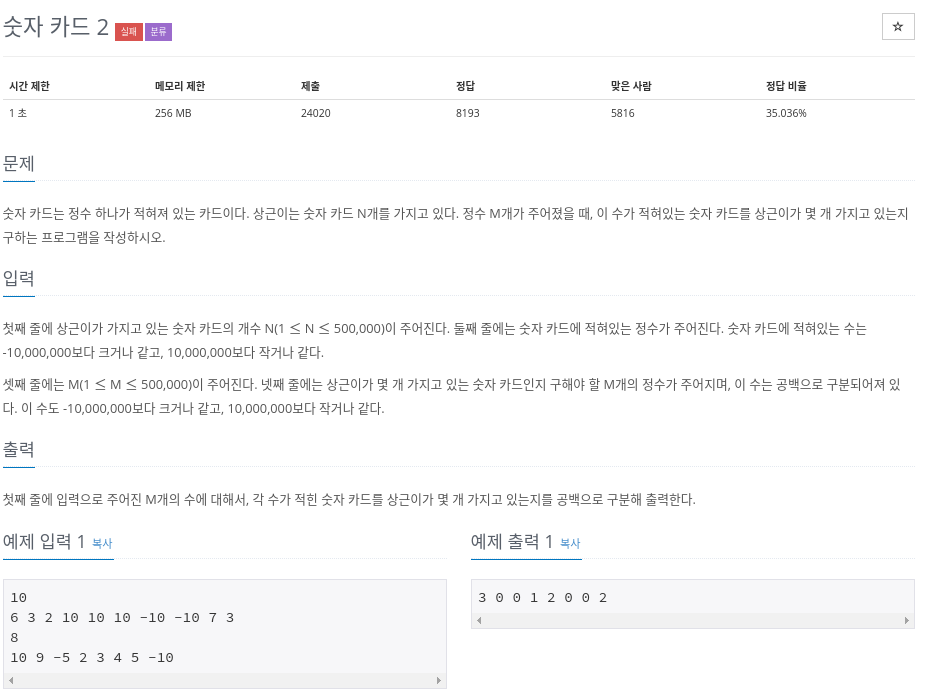
첫 번째 시도
while문으로 일치하는 숫자가 있으면 해당 target을 리스트에서 remove한 뒤 다시 이진 탐색 하게 해봤더니 시간 초과가 났다.
#coding:utf8
# 숫자 카드2
# 이진 탐색
from sys import stdin
M = int(stdin.readline())
MList = sorted(map(int, stdin.readline().split()))
N = int(stdin.readline())
NCards =map(int, stdin.readline().split())
def binary_search(searchList, target, startIndex, endIndex):
if startIndex > endIndex:
return False
mid = (startIndex + endIndex) // 2
if searchList[mid] == target:
return True
if target > searchList[mid]:
return binary_search(searchList, target, mid+1, endIndex)
else:
return binary_search(searchList, target, startIndex, mid-1)
result = list()
for n in NCards:
count = 0
startIndex = 0
while True:
endIndex = len(MList) -1
if binary_search(MList, n, startIndex, endIndex):
count += 1
MList.remove(n)
else:
break
result.append(count)
print(" ".join(map(str, result)))두 번째 시도
일치하는 게 없을 때까지 반복해서 이진탐색하는 방식은 시간초과였다.
그래서 한 번 탐색할 때 인접한 숫자들까지 검사하는 식으로 해봤지만 출력초과다.
어차피 작동도 안되는 코드..
뭔가 접근 방식 자체가 잘못된 것 같았다.
#coding:utf8
# 숫자 카드2
# 이진 탐색
from sys import stdin
M = int(stdin.readline())
MList = sorted(map(int, stdin.readline().split()))
N = int(stdin.readline())
NCards =map(int, stdin.readline().split())
count = 0
def binary_search(searchList, target, startIndex, endIndex):
print(searchList, target, startIndex, endIndex)
global count
if startIndex > endIndex:
return False
mid = (startIndex + endIndex) // 2
if searchList[mid] == target:
count += 1
near = mid
left = True
right = False
while near >= startIndex and near <= endIndex:
if searchList[near] == target:
if near != mid:
count += 1
else:
if left:
left = False
right = True
if right:
right = False
near = mid
continue
if left:
near -= 1
elif right:
near += 1
else:
break
return True
if target > searchList[mid]:
return binary_search(searchList, target, mid+1, endIndex)
else:
return binary_search(searchList, target, startIndex, mid-1)
result = list()
for n in NCards:
count = 0
startIndex = 0
endIndex = len(MList) -1
binary_search(MList, n, startIndex, endIndex)
print(count)
result.append(count)
print(" ".join(map(str, result)))최종 정답
결국 다른 사람 코드를 봤는데 해쉬테이블 자료구조(python에서는 딕셔너리)를 이용해서 해결하셨다.
알고리즘 분류를 한번 볼걸 그랬군
from sys import stdin
_ = stdin.readline()
N = map(int,stdin.readline().split())
_ = stdin.readline()
M = map(int,stdin.readline().split())
hashmap = {}
for n in N:
if n in hashmap:
hashmap[n] += 1
else:
hashmap[n] = 1
print(' '.join(str(hashmap[m]) if m in hashmap else '0' for m in M))